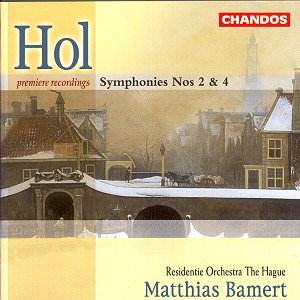Both of these recordings are World Premieres and they
give us a very welcome chance to try out a new composer who writes in
a very tonal style, and is an excellent orchestrator. Given the date
of composition you almost know what to expect before starting to listen
to this disc. The earlier issue (coupling 1 & 3 – CHAN 9796) was
not too well received in other quarters [review],
and I approached this disc with some trepidation. I am happy to say
that my initial expectations were more than turned over, and whilst
the present works are no world-shattering masterpieces, they are very
welcome additions to the catalogue.
Matthias Bamert does his usual first class job as conductor,
and the orchestra gives what appear to be excellent performances. The
Chandos recording is well up to the normal house standard, so Richard
Hol has just about as good advocacy as he could possibly expect. Chandos
is in the process of uncovering for us some of the Dutch repertoire
(is there such a thing?, I can hear many say). I can vouch for
some of the orchestral works produced by Dutch composers who desperately
need further exposure. Hendrik Andriessen is one – he has written four
superb symphonies – Haitink and the Concertgebouw did No 4 at the Proms
in the 1980s which was very well received. In addition, the current
orchestra issued two sets of vinyl recordings of Dutch repertoire in
the late 70s, subsequently transferred to CD by Olympia in 8 volumes
– well worth investigating if you can get hold of copies. Chandos is
now taking up the baton, and I hope that it will be a successful series
for them. Bamert’s previous series of Contemporaries of Mozart seemed
to do well. Maybe there is an interested body of collectors out there
who will support this series – I certainly hope so.
Robert Hol made his name in the Netherlands in the
mid 19th Century, primarily by his academic work. He was
hailed as composer, conductor, organist, pianist and had a great influence
on the musical life of his country. He graduated from the Royal Music
School in Amsterdam in 1844 and began his career by accompanying the
vocal and instrumental soloists of the day at the piano, and also by
teaching. He developed his conducting career, primarily as a choral
conductor, although he was active with orchestral repertoire as well.
He started composing, again mainly for choir and solo vocal music, and
some of these works became staple diet for large numbers of singers
during the latter half of the 19th Century. His oeuvre for
orchestra was much smaller, and the series of four symphonies now recorded
by Chandos form the greater part of this output.
Hol’s second symphony (influenced by Mendelssohn and
Schubert) is a traditional sonata form movement preceded by a slow introduction.
There then follows a slow movement, dark and prayerful, which makes
quite an impression. We then have a presto, which is in the style of
a Mendelssohnian scherzo, and this is followed by the very lively finale,
quite out of character for what one might expect to come out of Holland.
The fourth symphony is receiving here what seems to
be its first performance. It was never published, and for this recording,
the symphony was produced from the newly published score, based on the
autograph. It starts with another slow introduction and then moves on
in a spirited fashion which recalls the music of Dvorak. A presto scherzo
follows which is full of life and great fun. The third movement, a deeply
felt adagio partially in the style of Brahms follows and this I found
to be especially moving. The Allegro vivace finale, again in the style
of Mendelssohn, rounds off the work. Thus we come to the end of a very
enjoyable disc.
John Phillips

![]() Residentie Orchestra The
Hague – Matthias Bamert
Residentie Orchestra The
Hague – Matthias Bamert ![]() CHANDOS CHAN 9952 [62.35]
CHANDOS CHAN 9952 [62.35]